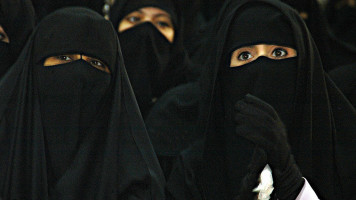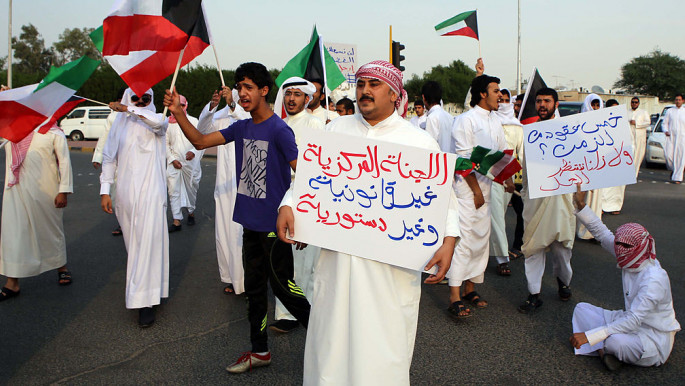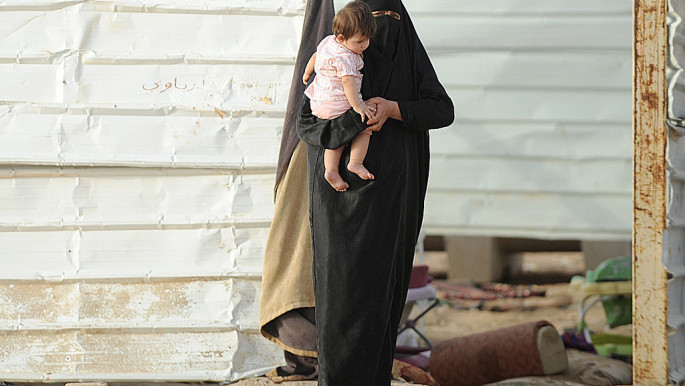
Unsung, unseen and unheard: Kuwait’s stateless Bidoon women speak out
Society8 min read
Yousef H. Alshammari
14 April, 2022
Facing both a complicated set of socio-political obstacles and cultural impediments, women in Kuwait continue to struggle in voicing their political needs in political action. For stateless women, much of that same voice is largely muffled
“Let’s get to the Kuwaiti woman first and then we’ll get to worrying about the Bidoon one.”
Hadeel Al-Shammari, a stateless woman, recalled hearing an audience member interrupt famed human rights activist Ibtihal Al-Khatib, who is also a professor in Kuwait University’s literature and the English department, during an event held by local women’s rights organisations.
The interruption, Hadeel said, was a symbolic moment where “despite the efforts to amplify the struggles stateless women endure, their attempts for representation are silenced on the spot.”
"Long regulated to the side-lines in the fight for naturalization and civil rights by both the state and stateless men, Bidoon women stereotypically occupy a short selection of roles in the Kuwaiti imagination, roles that are both demeaning and draconic"
Spanning from late 2020 to well past Summer 2021, Kuwait has witnessed what many have dubbed a #MeToo moment in the Gulf nation. A rising number of femicide and sexual harassment cases have gone unpunished, with a male-only parliament uninterested in legislating progressive laws securing women’s rights, thus prompting an uproar of Kuwaiti women's voices.
Women organised protests, mobilised their voices across social media and went far enough to gain access to members of parliament to negotiate better laws.
With a deadlocked parliament and exhausted activism, no substantial change was enacted. Although Kuwaiti women’s efforts for change carried considerable momentum, not all voices managed to carry the same weight.
“In truth, this society doesn’t know anything about Bidoon women,” said Hadeel, who’s long been an activist for stateless rights and a writer often covering the various realities stateless women face. “And that’s because they don’t want to know.”
At the end of March, a group of activists began a hunger strike and launched the #Bedoon_strike hashtag in English and Arabic.
"In solidarity with the stateless people on hunger strike. Personally, my family has reached 5 generations of statelessness, many of us with Kuwaiti mothers. Leaving gave me my basic human rights, and robbed me of my language, culture, and family," tweeted US-based writer Zahra Marwan.
Entering their third week of the hunger strike, the Bidoon activists continue in their attempts to pressure the government to give them their full rights
An ostracized group
Kuwait’s stateless population, more commonly referred to as Bidoon, short for Bidoon Jinsiya which translates to English as “without nationality and/or citizenship,” is estimated to amass between 150,000 to 350,000 people.
Because the Bidoon population, mostly and historically of tribal origins, is without government documentation and the privileges that come with a nationality, they are effectively barred from any and all access that the citizen and residents alike enjoy.
The stateless individual suffers inaccessibility to education, health, housing, economic stability and political representation.
For the stateless woman, Hadeel said, that exclusion is tenfold. Alongside the state ostracizing Bidoon women from their access to rights, specific power dynamics further charge both their erasure and dismissal.
On one hand, she explains, patriarchal norms violently squelch their voices while on the other hand, more powerful women, specifically Kuwaiti women, dominate the spaces in which those squelched voices could reach society at large.

Stateless Arabs, known as Bidoon, take part in a protest to demand citizenship and other basic rights in Jahra, 50 km (31 miles) northwest of Kuwait City [Getty Images]
“To the multitudes of institutional bodies focused on women’s rights, the Bidoon woman has never been a priority. She is politically weak, she has no say on her representation in these institutions, she can’t even become a member let alone sit on the board and direct an initiative,” Hadeel said, having direct experience with women’s associations in Kuwait and often partaking as a guest speaker.
“The struggles of women overlap, regardless of their place in society, but the stateless woman suffers an acute form of systemic oppression because she has no access to any civil right.”
An activist for stateless and women’s rights from a young age, Asrar Al-Hazaa observed over the years what she details as a rapid evolution in feminist rhetoric. From her years active as a stateless college student to her current participation in Kuwait’s intellectual scene as a librarian for Takween, a prominent publishing house, Al-Hazaa recalls a growing yet still restrained movement.
“The conversations on women’s rights quickly shifted from wanting a sense of autonomy and equality to realising these freedoms need to be protected by policy,” she told The New Arab. “These are not superficial battlegrounds, women need all of these freedoms. But, these voices came from a very specific, elitist sylo.”
“To the multitudes of institutional bodies focused on women’s rights, the Bidoon woman has never been a priority. She is politically weak, she has no say on her representation in these institutions, she can’t even become a member let alone sit on the board and direct an initiative,” Hadeel said, having direct experience with women’s associations in Kuwait and often partaking as a guest speaker.
“The struggles of women overlap, regardless of their place in society, but the stateless woman suffers an acute form of systemic oppression because she has no access to any civil right.”
An activist for stateless and women’s rights from a young age, Asrar Al-Hazaa observed over the years what she details as a rapid evolution in feminist rhetoric. From her years active as a stateless college student to her current participation in Kuwait’s intellectual scene as a librarian for Takween, a prominent publishing house, Al-Hazaa recalls a growing yet still restrained movement.
“The conversations on women’s rights quickly shifted from wanting a sense of autonomy and equality to realising these freedoms need to be protected by policy,” she told The New Arab. “These are not superficial battlegrounds, women need all of these freedoms. But, these voices came from a very specific, elitist sylo.”
When Bidoon voices step in and speak of their struggles, Al-Hazaa said the exclusion was rampant. Despite their best efforts to “ward off untruthful and harmful ideologies in society,” the dismissal is blatant enough to tell the stateless community that “you don’t exist to me,” she added.
This erasure of realities suffered by stateless people plays into a “cycle of racism,” which leaves Al-Hazaa dispirited when confronting misplaced public opinion. For her, the erasure sends Bidoon women one of two messages, either discouraging their activism or worse: “you’ll never be one of us.”
Long regulated to the sidelines in the fight for naturalization and civil rights by both the state and stateless men, Bidoon women stereotypically occupy a short selection of roles in the Kuwaiti imagination, roles that are both demeaning and draconic.
In one role, the Bidoon woman is the disposable, hypersexualized commodity; she is the attractive storefront welcoming patrons with the comfort of a Kuwaiti face and an approachable accent, or the sexual object of a Kuwaiti man ill-suited to marry a compatriot.
In another role, she is the elderly ground-level gargoyle, gowned in black and begging for money outside of mosques and markets.
"The term ‘woman’ often goes unchallenged, but when we look at it closely it is often used among government officials and women’s organizations to describe a specific kind of woman in Kuwait"
Coming from a family of stateless rights activists, Hadiya Al-Onan is no stranger to the same dynamics Hadeel or Al-Hazaa experience. Al-Onan, who is also stateless herself, explained two distinct dynamics a stateless woman endures more acutely than any other faction of women in Kuwait.
“Stateless people make for extremely cheap labour, cheaper than migrant workers but still with that Kuwaiti appearance and dialect which makes them the ideal set of spare parts for the national capitalist machine,” Al-Onan said. “That puts stateless women in the lowest circles of social mobility alongside social pressures against her working.”
The other dynamic focuses on a “trickle-down-oppression,” she said, as the state “corners a stateless man into a place where no political frustration can be expressed until that bottled-up helplessness finds a suitable, weaker target: the stateless woman.”

Bidoons have long been marginalised and are not entitled to state-provided services and benefits
[Getty Images]
Al-Onan calls her observation of “state-sponsored misogyny” the “broken man syndrome,” outlining the direct patriarchal relationship between political erasure of stateless people as a whole and the violence it inflicts on stateless women.
“But now, a lot of our men have had this awakening recently, a better economic understanding of how the Kuwaiti government views us and a better appreciation of what Bidoon women bring to the activist field,” she said. “Now, our education is more encouraged than before. Now, more Bidoon men realise they can’t win without us.”
The Bidoon woman continues to suffer a grand societal rejection, the snubbing has softened over the years as a combination of social media access and civil coalition building, although minimal, empowered the voices of stateless women. The social barriers, however, remain well in place.
Before she migrated to Canada, Areej Al-Shammiry, formerly stateless yet remains an activist on many Kuwaiti issues through her doctoral research and writing, was “directly involved” with a number of movements and organisations for stateless rights.
“There was never a mention of Bidoon women or migrant women in any of the discussions about women’s rights,” Areej told The New Arab, adding that her participation in women’s rights circles left her “unseen and unheard.”
Now, Areej’s solidarity with women’s rights movements is predominantly online and one great obstacle when digitally sharing real-life narratives, she said, it’s co-opted by classist and state rhetoric. When it isn’t morphed out of context or silenced, the voice of a Bidoon woman is painted as colourful lies.
“The term ‘woman’ often goes unchallenged, but when we look at it closely it is often used among government officials and women’s organisations to describe a specific kind of woman in Kuwait,” Areej explained, pointing to the series of proposed bills for women’s rights in parliament during 2021 which, by proxy of their statelessness, excluded Bidoon women.
A larger burden of death: Kuwait's migrant workers and COVID
Like Al-Onan, Areej sees a greater problem hiding under the slew of social and cultural barriers prohibiting women from political participation at large.
Beyond the conservative lines drawn to silence women, Areej sees a connection between “the systemic violence of the state” and the “patriarchal institution of the home.”
“This omission of gender dynamics and conditions that exists in the Bidoon community, and leaves Bidoon women fending for themselves in the private realm, leave their struggles with the state and patriarchy non-politicized,” she said, noting that which remains “taboo” cannot be used to “break down barriers.”
Yousef H. Alshammari is a US-based Kuwaiti journalist and writer with a focus on international politics and culture.
Follow him on Twitter: @YousefWryRonin
Al-Onan calls her observation of “state-sponsored misogyny” the “broken man syndrome,” outlining the direct patriarchal relationship between political erasure of stateless people as a whole and the violence it inflicts on stateless women.
“But now, a lot of our men have had this awakening recently, a better economic understanding of how the Kuwaiti government views us and a better appreciation of what Bidoon women bring to the activist field,” she said. “Now, our education is more encouraged than before. Now, more Bidoon men realise they can’t win without us.”
The Bidoon woman continues to suffer a grand societal rejection, the snubbing has softened over the years as a combination of social media access and civil coalition building, although minimal, empowered the voices of stateless women. The social barriers, however, remain well in place.
Before she migrated to Canada, Areej Al-Shammiry, formerly stateless yet remains an activist on many Kuwaiti issues through her doctoral research and writing, was “directly involved” with a number of movements and organisations for stateless rights.
“There was never a mention of Bidoon women or migrant women in any of the discussions about women’s rights,” Areej told The New Arab, adding that her participation in women’s rights circles left her “unseen and unheard.”
Now, Areej’s solidarity with women’s rights movements is predominantly online and one great obstacle when digitally sharing real-life narratives, she said, it’s co-opted by classist and state rhetoric. When it isn’t morphed out of context or silenced, the voice of a Bidoon woman is painted as colourful lies.
“The term ‘woman’ often goes unchallenged, but when we look at it closely it is often used among government officials and women’s organisations to describe a specific kind of woman in Kuwait,” Areej explained, pointing to the series of proposed bills for women’s rights in parliament during 2021 which, by proxy of their statelessness, excluded Bidoon women.
A larger burden of death: Kuwait's migrant workers and COVID
Like Al-Onan, Areej sees a greater problem hiding under the slew of social and cultural barriers prohibiting women from political participation at large.
Beyond the conservative lines drawn to silence women, Areej sees a connection between “the systemic violence of the state” and the “patriarchal institution of the home.”
“This omission of gender dynamics and conditions that exists in the Bidoon community, and leaves Bidoon women fending for themselves in the private realm, leave their struggles with the state and patriarchy non-politicized,” she said, noting that which remains “taboo” cannot be used to “break down barriers.”
Yousef H. Alshammari is a US-based Kuwaiti journalist and writer with a focus on international politics and culture.
Follow him on Twitter: @YousefWryRonin
No comments:
Post a Comment